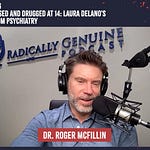If you're a parent, therapist, clinician, or prescriber who believes antidepressants are both effective and safe for children and adolescents—and you're comfortable recommending them as "evidence-based treatments"—what I'm about to share will be deeply uncomfortable.
But I'd argue it's your ethical duty to keep reading (and watch the full Radically Genuine Podcast episode above)
The Illusion of Evidence-Based Medicine
In my recent Radically Genuine Podcast episode (watch full episode above), I interviewed Professor John Jureidini, a child psychiatrist who leads the Critical and Ethical Mental Health Research Group at Adelaide University in Australia. His decades of work exposing how pharmaceutical companies manipulate clinical trial data reveals an uncomfortable truth: what we call "evidence-based medicine" has been thoroughly corrupted.
"The preferred methodology of the randomized controlled trial is the arbiter of whether something is evidence-based," explained Jureidini. "If you're a pharmaceutical company wanting to sell your drug, you don't need to think about whether your drug actually works. What you need to do is demonstrate that it can beat placebo on a randomized controlled trial."
And here's where it gets dark: instead of setting stringent tests likely to catch problems with their drugs, pharmaceutical companies do exactly the opposite—they design studies most likely to support their favorite ideas, all while maintaining the appearance of "robust methodology."
The TADS Study: A Case Study in Deception
Let's look at the Treatment of Adolescents with Depression (TADS) study from 2004, which is still cited today as the key evidence supporting the use of fluoxetine (Prozac) in depressed teens.
This study emerged at a critical moment—the same year the FDA held hearings on increased suicide risks with SSRIs in youth, which ultimately led to a black box warning. During those hearings, an FDA official reported that 12 of 15 pediatric antidepressant trials had failed to outperform placebo.
Yet somehow, TADS managed to produce results supporting medication. How?
According to Jureidini's analysis,
Listen to this episode with a 7-day free trial
Subscribe to Radically Genuine to listen to this post and get 7 days of free access to the full post archives.












